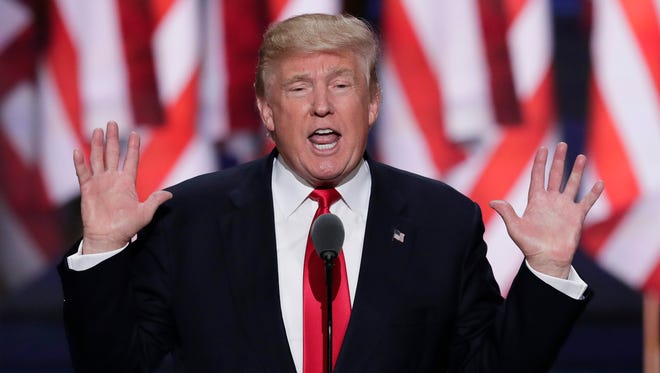On debate eve, Trump proposes new ethics rules, term limits for Congress

WASHINGTON — Republican presidential candidate Donald Trump says he will push a package of ethics changes if elected that includes a law banning executive branch employees and members of Congress from lobbying the government for five years after they leave office.
The proposal marks the first detailed ethics policy from the New York businessman who has long decried the role of lobbyists in Washington and has sought to cast his Democratic rival Hillary Clinton as criminally corrupt.
He argued that Clinton is beholden to moneyed special interests, including foreign donors to the Clinton Foundation, and said he would bar senior executive branch officials from ever lobbying on behalf of a foreign government and would prohibit foreign lobbyists from raising money in U.S. elections.
Trump also wants to expand the definition of lobbyist to include people who label themselves “consultants” or “advisers” but who focus on helping clients navigate Washington and shape federal policy.
“It is time to drain the swamp in Washington, D.C.,” Trump declared at a rally Monday night in Wisconsin, where he unveiled the plan, just two days before he and Clinton are slated to face off in their final presidential debate.
On Tuesday, Trump added another element to his ethics plans, announcing that he would pursue a constitutional amendment, imposing term limits on members of Congress.
Third Trump-Clinton debate could provide explosive finale
Government watchdogs say Trump’s lobbying proposals fall short because they apply to lawmakers and subordinates and do little address the novel ethics issues his own presidency would pose.
Trump, for instance, has not released his tax returns, bucking a four-decade tradition for presidential candidates. He has cited an ongoing IRS audit for his refusal to do so. He’s also said he would avoid conflicts of interest with his branding and real-estate empire by having his children run the company during his time in the White House.
Previous presidents have gone further, often divesting themselves of their outside business interests, putting their investments in a blind trust in which a third-party manages their assets or stashing their money in broadly diverse funds.
“If he’s going to be credible, he needs to focus on the issues with respect to himself,” said Richard Painter, the former chief ethics lawyer in President George W. Bush’s White House.
“These proposals, when they say nothing about the man at the top, will accomplish very little,” he added. “They are as good as the Enron Code of Ethics, which can be had for a song on eBay.”
Trump’s move to close lobbying loopholes marks an “important” step, said Lisa Gilbert of the liberal-leaning watchdog group Public Citizen. But she said the group also wants candidates to address the “power of big money” in politics and work to overturn the Supreme Court’s Citizens United decision, which opened the door to unlimited corporate and union money in candidate elections.
For her part, Clinton has promised to call for a constitutional amendment overturning the Supreme Court’s decision in her first 30 days as president and has endorsed legislation by Sen. Tammy Baldwin, D-Wis., that would clamp down on lobbyists posing as “consultants." The measure also would bar former executive branch employees from taking a job at a company they regulated for two years after leaving the government.
Hillary Clinton will push constitutional amendment to overturn Citizens United
She also has pledged to sign an executive order requiring federal government contractors to disclose their political giving.
Clinton, unlike President Obama, is accepting campaign money and fundraising help from lobbyists. But her aides say she has not hired any lobbyists to work on her presidential transition team or to serve on any of the campaign’s policy advisory groups.
The candidates have not said whether they will maintain Obama’s executive order banning most federal lobbyists from working in the executive branch.